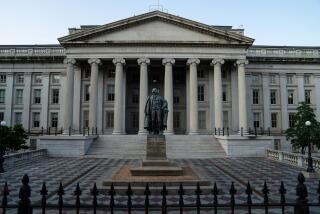OMB Sees ’87 Deficit of $158 Billion : Decline Laid to One-Time Windfall in Capital Gains Taxes
- Share via
WASHINGTON — The Reagan Administration predicted Monday that the nation’s budget deficit will fall by $62.3 billion to $158.4 billion this year, aided by a one-time windfall in tax revenues, and that it will continue to drop by multibillion amounts for the rest of the decade because of steady increases in economic growth and sharply reduced spending.
The projections were released by the Office of Management and Budget, which by law is required to submit to Congress a “mid-session review” of the estimates and economic assumptions presented in the President’s budget message in January.
Analysts on Capitol Hill and in the private sector for the most part share the Administration’s optimism about the deficit for 1987, a fiscal year that will be ending in six weeks, but they reject the projection of a still lower deficit in 1988.
Mark Desautels, a staff member at the Congressional Budget Office, pointed out that the projections assume the “adoption of the President’s budget proposals.”
In February, Congress dismissed an Administration budget, calibrated to cut the deficit to $107.8 billion in 1988, and Monday’s revision of that estimate for next year to $123.3 billion was discounted as well.
“Their economic assumptions are ambitions, not policy objectives,” said Roger Brinner of Data Resources Inc., a Lexington, Mass., economic forecasting firm. “Both they and Congress have to do much more work to reach those objectives.”
In its report, the OMB lowered the earlier budget deficit forecast for 1987 but raised the deficits projected for the next two years. Nevertheless, the totals still showed the deficit dropping each year.
The OMB predicted that:
--In 1987, the budget deficit would be $158.4 billion, substantially less than the $173.2 billion forecast in January and a sharp drop from the 1986 deficit of $220.7 billion. The revision was primarily attributed to $16.1 billion in extra tax revenues, mostly generated by taxpayers electing to pay capital gains taxes under the more preferential rates in force before the tax revision law went into effect this year.
--In 1988, the deficit would fall to $123.3 billion, largely because of the effects of economic growth. The jump from the January projection of $107.8 billion was tied to a drop in corporate tax payments--the backlash of the 1987 windfall--and somewhat higher spending because of increased inflation and rising interest rates.
--In 1989, the deficit would be $112.7 billion, another annual drop but higher than the previous forecast of $92.8 billion. The same spending pressures and economic factors were cited in the revision.
On Wednesday, the CBO--an arm of Congress--will disclose its own deficit projections of $157 billion for 1987, $183 billion for 1988 and $192 billion for 1989. Those numbers will be based on less optimistic assessments of economic growth and expectations of higher spending.
One analyst, Allen Sinai of Shearson Lehman Bros. in New York, termed both views too rosy. He predicted annual deficits of $165 billion, $205 billion and $200 billion through 1989 and said that the Administration’s numbers are “impossibly low, completely unrealistic.”
The main difference between Administration officials and the private sector, Brinner said, is that “their revenue predictions are based on 3.5% or 3.4% annual (economic) growth, and we predict 2.5% growth. That adds up to at least $12 billion a year, compounded. They see lower inflation, lower unemployment and lower interest rates than we do, and that makes a difference on the spending side as well.”
In addition to the estimates based on enacting Reagan’s budget, the Administration differed in its estimates of what it would cost to maintain current government services with no changes in policy. In contrast to the private sector consensus that deficits crowding $200 billion are sure to return if there are no changes in spending or tax policy, the OMB predicted deficits of $161.4 billion in 1988 and $165.9 billion in 1989.
More to Read
Get the L.A. Times Politics newsletter
Deeply reported insights into legislation, politics and policy from Sacramento, Washington and beyond. In your inbox twice per week.
You may occasionally receive promotional content from the Los Angeles Times.










